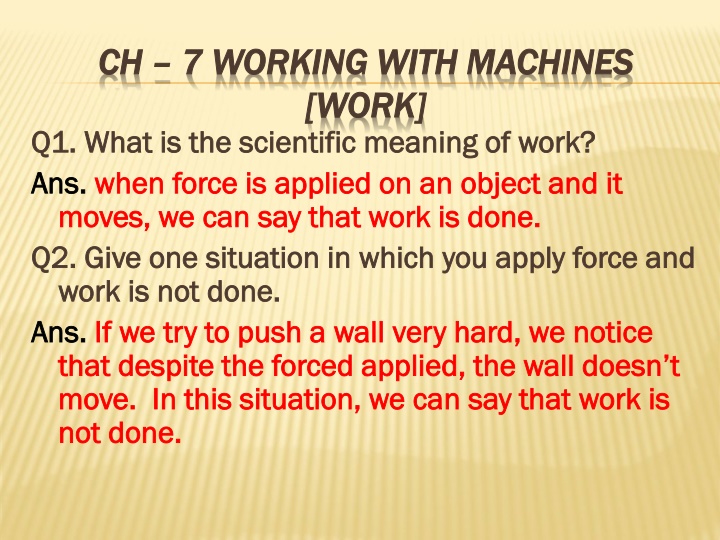
Work, Simple Machines, and Tools in Science
Explore the scientific meaning of work, examples of work done using force, types of simple machines like wedges and pulleys, filling in the blanks about screws and pulleys, and answering questions on screws, inclined planes, and wedges.
Download Presentation

Please find below an Image/Link to download the presentation.
The content on the website is provided AS IS for your information and personal use only. It may not be sold, licensed, or shared on other websites without obtaining consent from the author. If you encounter any issues during the download, it is possible that the publisher has removed the file from their server.
You are allowed to download the files provided on this website for personal or commercial use, subject to the condition that they are used lawfully. All files are the property of their respective owners.
The content on the website is provided AS IS for your information and personal use only. It may not be sold, licensed, or shared on other websites without obtaining consent from the author.
E N D
Presentation Transcript
CH CH 7 WORKING WITH MACHINES 7 WORKING WITH MACHINES [WORK] [WORK] Q1. What is the scientific meaning of work? Q1. What is the scientific meaning of work? Ans. Ans. when force is applied on an object and it when force is applied on an object and it moves, we can say that work is done. moves, we can say that work is done. Q2. Give one situation in which you apply force and Q2. Give one situation in which you apply force and work is not done. work is not done. Ans. Ans. If we try to push a wall very hard, we notice If we try to push a wall very hard, we notice that despite the forced applied, the wall doesn t that despite the forced applied, the wall doesn t move. In this situation, we can say that work is move. In this situation, we can say that work is not done. not done.
Q3. When work is done? Q3. When work is done? Ans. Ans. When the objects move by applying force, we When the objects move by applying force, we can say that work is done can say that work is done. . Q4. Give 3 examples of work done using force. Q4. Give 3 examples of work done using force. Ans. Ans. Cycling Cycling Running Running Swimming Swimming
SIMPLE MACHINES SIMPLE MACHINES Q1. Write the type of simple machines : Q1. Write the type of simple machines : a) a) Roller Skate Roller Skate Wheel and Ax Wheel and Axle le. . b) b) Flag Pole Flag Pole Pulley Pulley c) c) Bottle Opener Bottle Opener Lever d) d) Knife Knife Wedge Wedge e) e) Scissors Scissors Lever Lever f) f) Ramp Ramp- - Inclined plane Inclined plane g) g) Car jack Car jack- - Screw Screw Lever
FILL IN THE BLANKS 1. 1. Wedge, Pulley and Screw are few examples of Wedge, Pulley and Screw are few examples of simple machine. machine. 2. 2. In our everyday life we use simple tools to make our In our everyday life we use simple tools to make our work work easier easier. . 3. 3. Screw Screw looks like a nail with grooves on it. looks like a nail with grooves on it. 4. 4. A A pulley pulley is used to for drawing water with a b is used to for drawing water with a bucke from the well. from the well. Steering Wheel is a Steering Wheel is an n example of example of wheel and axle simple ucket t wheel and axle. . 5.
ANSWER THE FOLLOWING Q1. How does a screw look like? Q1. How does a screw look like? Ans. Ans. A screw looks like a nail with grooves on it. A screw looks like a nail with grooves on it. e eg g. Car jack jack Q2. Write a short note on inclined plane. Q2. Write a short note on inclined plane. Ans. Ans. An inclined plane looks like a sloping or slanting An inclined plane looks like a sloping or slanting surface raised at one end. A heavy object can be surface raised at one end. A heavy object can be pushed up or down an inclined plane easily. pushed up or down an inclined plane easily. e eg g. slide Q3. Why are wedges used? Q3. Why are wedges used? Ans. Ans. Wedges are used for pushing objects apart, or cutting Wedges are used for pushing objects apart, or cutting and an object into smaller pieces. and an object into smaller pieces. e eg g. knife . Car . slide . knife
Q4. What is lever? Name 3 parts of lever. Q4. What is lever? Name 3 parts of lever. Ans. Ans. A lever is used to lift objects with less effort. A lever is used to lift objects with less effort. e eg g. Scissors. Load, fulcrum and force or effort . Scissors. Load, fulcrum and force or effort are three parts of lever. are three parts of lever. Q5. How many types of simple machines are Q5. How many types of simple machines are there? Name them. there? Name them. Ans. Ans. There are six types of simple machines. They There are six types of simple machines. They are Lever, Screw, Inclined Plane, Wedge, Pulley, are Lever, Screw, Inclined Plane, Wedge, Pulley, and Wheel and Axle. and Wheel and Axle.
GIVE 2 EXAMPLES OF EACH 1. 1. Lever = Lever = Nut Cracker, Stapler. Nut Cracker, Stapler. 2. 2. Wheel and Axel = Wheel and Axel = Steering Wheel, Rolling Steering Wheel, Rolling Skate. Skate. 3. 3. Wedge = Wedge = Knife, Axe Knife, Axe 4. 4. Screw = Screw = Bottle Cap, Car Jack Bottle Cap, Car Jack 5. 5. Inclined Plane = Inclined Plane = Slide, Ramp Slide, Ramp 6. 6. Pulley = Pulley = flagpole, Elevator flagpole, Elevator
